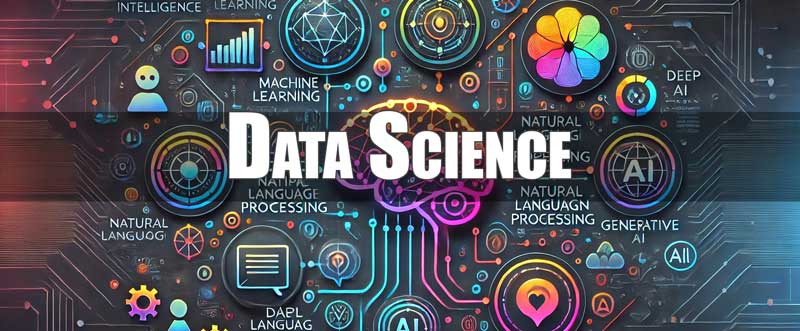What is Data Science?
Data Science is a multi-disciplinary field that uses various techniques, algorithms, and systems to extract insights and knowledge from structured and unstructured data. It is a fusion of several domains, including statistics, computer science, data engineering, and machine learning, to solve complex problems and drive decision-making in business, healthcare, finance, and many other industries. Data science helps organizations transform raw data into actionable insights, enabling them to make informed decisions, optimize processes, and gain a competitive edge.
Data scientists use a wide array of techniques, such as data mining, statistical modeling, machine learning, artificial intelligence, and data visualization to analyze large datasets and interpret the results. The role of a data scientist is essentially a blend of statistics, computer programming, and domain knowledge to apply data-driven methods for solving problems and identifying trends.
The Future of Data Science
The future of data science is undeniably promising, driven by technological advancements and the increasing reliance on data across various industries. Here’s a look at some key trends shaping the future of data science:
- Increased Automation and AI Integration
As artificial intelligence (AI) continues to evolve, data science will see a further shift toward automation. Machine learning (ML) and deep learning algorithms are increasingly capable of performing tasks that previously required human intervention. This shift will enhance data science workflows by improving predictive modeling, data preprocessing, and decision-making processes. The future will likely see data scientists collaborating with AI systems that can analyze data faster and more efficiently. - Data Democratization
Data democratization refers to making data and analytics accessible to everyone within an organization, not just specialized data scientists. This will be further supported by no-code and low-code tools that enable non-technical users to interact with and derive insights from data. By making data science tools easier to use, organizations will empower a wider range of employees to participate in data-driven decision-making. - AI-Driven Predictive Analytics
Data scientists will increasingly leverage AI for predictive analytics, using machine learning models to forecast future trends. This will significantly impact industries like retail, healthcare, and finance by enabling them to make proactive decisions and better allocate resources. - Cloud Computing and Big Data
The shift to cloud computing is enabling businesses to handle ever-growing datasets without the constraints of on-premise infrastructure. Platforms like AWS, Microsoft Azure, and Google Cloud are becoming essential for storing and processing large volumes of data. This will enable faster, more scalable data analysis across industries. - Edge Computing for Real-Time Data
The rise of IoT devices and sensors is generating real-time data that needs immediate analysis. Edge computing processes data closer to its source, enabling quicker insights and reducing latency. As the demand for real-time analytics increases, data scientists will need to adapt to these new challenges and leverage technologies that support this shift.
Market Impact of Data Science
The market impact of data science is profound, touching nearly every aspect of the economy. As organizations generate more data than ever before, the ability to analyze this data effectively becomes a major differentiator. Data science is making waves in various industries:
- Business and Finance
In business, data science helps companies identify patterns in customer behavior, predict sales trends, and personalize marketing efforts. Financial institutions use data science to detect fraudulent transactions, optimize trading strategies, and manage risk more effectively. - Healthcare
In healthcare, data science is revolutionizing the way doctors diagnose diseases, predict patient outcomes, and recommend treatments. Machine learning models are also helping to discover new drugs and understand genetic patterns that could lead to breakthroughs in personalized medicine. - Retail and E-commerce
Retailers and e-commerce businesses use data science for inventory management, demand forecasting, and personalized product recommendations. By analyzing customer data, they can tailor the shopping experience to individual preferences, increasing sales and customer satisfaction. - Manufacturing
In manufacturing, data science helps optimize production lines, predict equipment failures, and streamline supply chain management. By using predictive maintenance techniques, businesses can reduce downtime and improve efficiency. - Entertainment
Data science is transforming the entertainment industry by enabling platforms like Netflix and Spotify to deliver personalized content recommendations. Streaming services use complex algorithms to predict user preferences and improve content delivery.
Business Benefits of Data Science
Organizations that adopt data science stand to gain several business benefits, which include:
- Improved Decision Making
Data science enables businesses to make data-driven decisions by providing insights based on objective analysis rather than intuition or guesswork. This leads to better strategic planning, resource allocation, and risk management. - Increased Efficiency
By automating data analysis processes, data science frees up time for employees to focus on more strategic tasks. Companies can streamline operations and improve efficiency across the board, leading to reduced costs and improved profitability. - Enhanced Customer Experience
Data science enables businesses to understand customer preferences and behaviors on a deeper level. Companies can deliver personalized experiences that resonate with customers, increasing satisfaction and loyalty. - Competitive Advantage
Organizations that leverage data science can gain a competitive advantage by predicting market trends, identifying new opportunities, and responding faster to customer needs. This allows them to stay ahead of competitors and capitalize on emerging market trends. - Innovation
Data science allows businesses to experiment with new ideas and test hypotheses quickly. With the ability to analyze vast amounts of data, companies can innovate more effectively, developing new products, services, and solutions that cater to market demands.
Where to Learn Data Science
Data science is an ever-evolving field, and there are various ways to learn and build a career in this domain:
- University Degrees
Many universities offer degree programs in data science, machine learning, artificial intelligence, and related fields. A formal degree can provide a strong foundation in mathematics, statistics, and programming, all essential skills for a data scientist. - Online Courses
There are several platforms offering online courses and certifications in data science. Some popular platforms include:- Coursera: Offers courses from top universities such as Stanford and MIT.
- Udacity: Provides a Data Scientist Nanodegree with practical projects.
- edX: Offers free courses from institutions like Harvard and UC Berkeley.
- DataCamp: Focuses on interactive courses with a hands-on approach.
- Bootcamps
Data science bootcamps provide intensive, short-term training for individuals looking to transition into the field quickly. These bootcamps often focus on practical skills and industry-relevant tools. Examples include:- General Assembly
- Springboard
- Le Wagon
- Books and Tutorials
There are numerous books and online tutorials that teach data science concepts. Books such as “Python for Data Analysis” by Wes McKinney and “Hands-On Machine Learning with Scikit-Learn, Keras, and TensorFlow” by Aurélien Géron are excellent resources for beginners.
Tools and Technologies Used in Data Science
Data science involves a variety of tools and technologies, including:
- Programming Languages
- Python: The most popular language for data science due to its simplicity and extensive libraries (e.g., Pandas, NumPy, Matplotlib).
- R: Used for statistical analysis and data visualization.
- SQL: Essential for querying databases.
- Data Analysis and Visualization Tools
- Jupyter Notebook: An open-source web application for creating and sharing live code, equations, and visualizations.
- Tableau: A leading data visualization tool used for creating interactive dashboards.
- Power BI: A Microsoft product for business analytics and data visualization.
- Machine Learning Frameworks
- TensorFlow: An open-source platform for machine learning.
- Scikit-Learn: A library for data mining and machine learning.
- PyTorch: A deep learning framework popular among researchers and developers.
- Big Data Tools
- Apache Hadoop: A framework for processing large datasets in a distributed computing environment.
- Spark: A unified analytics engine for big data processing.
Scalability and Pricing
Data science solutions can be scaled based on the requirements of the organization. Tools and platforms like AWS, Google Cloud, and Azure offer scalable solutions for data storage, processing, and analysis. These platforms allow businesses to pay for only the resources they use, making it cost-effective for businesses of all sizes.
Salary Range in Data Science
The salary for data science professionals varies depending on factors such as experience, location, and industry. Here are some general salary ranges in the U.S. (as of 2024):
- Entry-level Data Scientist (0-2 years of experience): $70,000 – $100,000 per year.
- Mid-level Data Scientist (3-5 years of experience): $100,000 – $130,000 per year.
- Senior Data Scientist (5+ years of experience): $130,000 – $160,000+ per year.
Salaries may differ based on the region and specific job responsibilities, but the demand for skilled data scientists has created lucrative opportunities across industries.
The Long-Term Future of Data Science
Data science will continue to be a cornerstone of technological innovation and business transformation. With the exponential growth of data, the need for professionals who can analyze and interpret this data will only increase. The field’s growth will be fueled by advancements in artificial intelligence, machine learning, and automation, making it an exciting and dynamic area for career growth.
Conclusion
Data science is transforming industries by providing valuable insights that drive decision-making, improve efficiency, and



